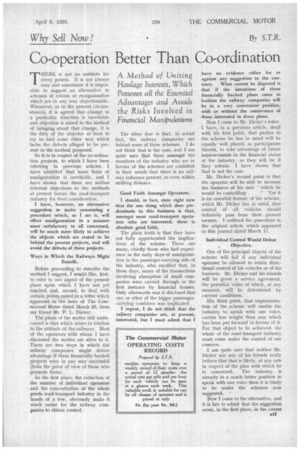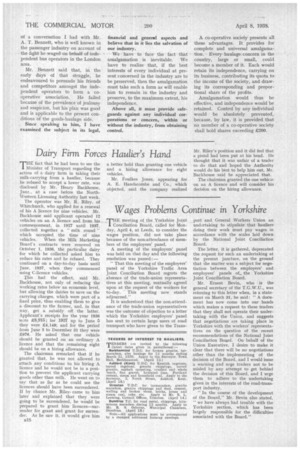Co-operation Better Than Co - ordination A Method of Uniting Haulage Interests,
Page 51

Page 52

If you've noticed an error in this article please click here to report it so we can fix it.
Which Possesses all the Essential Advantages and Avoids the Risks Involved in Financial Manipulations THERE, is not an antidote for every poison. It is not always easy and sometimes it is impossible to suggest an alternative to schemes of reform or reorganization which are in any way objectionable. Whenever, as in the present circumstances, it is agreed that change in a particular direction is inevitable and objection is raised to the method of bringing about that change, it is the duty of the objector at least to try to. find some other way which lacks the defects alleged to be present in the method proposed.
So it is in respect of the co-ordination projects, to which I have been referring in previous articles. I have admitted that some form of amalgamation is inevitable, and I have shown that there are sexibus inherent objections to the methods at present before the road-transport industry for their consideration.
I have, however, an alternative suggestion to make concerning a procedure which, as I see it, will effect amalgamation in a manner most satisfactory to all concerned, will be much more likely to achieve the objects which are stated to lie behind the present projects, and will avoid the defects of those projects.
Ways in Which the Railways Might Benefit.
Before proceeding to describe the method I suggest, I would like, first, to refer to one aspect of the present plans upon which I have not yet touched and, second, to deal with certain points raised in a letter which appeared in the issue of The Com-rnercsal Motor dated March 25, from -my friend Mr. P. L. Dicker:
The phase of the matter still undiscussed is that which arises in relation to the attitude of the railways. Most of the operators with whom I have discussed the matter are alive to it. There are two ways in which the railway companies might derive advantage if these financially backed projects were in any way successful (from the point of view of those who promote them). .
In the first place, the reduction of the number of individual operators and the concentration of the whole goods road-transport industry in the hands of a 'few, obviously make it much easier for the railway companies to obtain control.' The other fear is that, in actual fact, the railway companies are behind some of these schemes. I do not think that is the case, and I -am quite sure that those amongst the members of the industry who are in favour of the schemes are confident in their minds that there is no railway influence present, or even within striking distance.
Good Faith Amongst Operators.
I should, in fact, state right now that the one thing which does predominate in this business is that, amongst most road-transport operators who are interested, there is absolute good faith.
The plain truth is that they have not fully apprehended the implications of the scheme. There are many, chiefly those who had experience in the early days of amalgamation in the passenger-carrying side of the industry, who recollect that, in those days, many of the transactions involving absorption of small companies were carried through in the first instance by financial houses. Only afterwards was it disclosed that one or other of the bigger passengercarrying combines was implicated.
I repeat, I do not think that the railway companies are, at present, interested, but I must admit that I have no evidence either for or against any suggestion to the contrary. What cannot be disputed is that if the intentions of these financially backed plans come to fruition the railway companies will be in a very convenient position, with or without the connivance of those interested in those plans.
Now I come to Mr. Dicker's letter. I have, in a previous article, dealt with his first point, that parties to the scheme he has in mind will be equally well placed, as participators therein, to take advantage of future improvements in the financial status of the industry, as they will be if they refrain. I have shown that that is not the case.
Mr. Dicker's second point is that the operator will be able to increase the business of his unit " which he would be controlling . . ." Yet it is an essential feature of the scheme, which Mr. Dicker has in mind, that control of all vehicles should definitely pass from their present owners. I outlined the procedure in the original article which appeared in this journal dated March 11.
Individual Control Would Defeat Objective.
One of the principal objects of the scheme will fail if any individual operator be allowed to retain directional control of his vehicles or of his business. Mr. Dicker and his friends will be given a service agreement, the potential value of which, at any moment, will be determined by current conditions.
His third point, that implementation of the scheme will enable the industry to speak with one voice, carries less weight than any which has been put forward in favour of it. For that object to be achieved, the whole of the road-transport industry must COMB under the control of one concern.
I am quite sure that neither Mr. Dicker nor any of his friends really believe that that is likely, at any rate in respect of the plan with which he is concerned. The industry is already in a much better position to speak with one voice than it is likely to be under the schemes now suggested.
Now I come to the alternative, and it is fair to admit that the suggestion arose, in the first place, in the course B17 of a conversation I had with Mr. A. T. Bennett, who is well known in the passenger industry on account of the fight he waged on behalf of independent bus operators in the London area.
Mr. Bennett said that, in the early days of that struggle, he endeavoured to persuade his friends and competitors amongst the independent operators to form a cooperative association. He failed because of the prevalence of jealousy and suspicion, but his plan was good and is applicable to the present conditions of the goods-haulage side.
Since speaking to him, I have examined the subject in its legal, financial and general aspects and believe that in it lies the salvation of our industry.
We have to face the fact that amalgamation is inevitable. We have to realize that, if the best interests of every individual at present concerned in the industry are to be preserved, then the amalgamation must take such a form as will enable him to remain in the industry and preserve, to the maximum extent, his independence.
Above all, it must provide safeguards against any individual corporations or concern, within or without the industry, from obtaining control. A co-operative society presents all these advantages. It provides for complete and universal amalgamation. Every haulage concern in the country, large or small, could become a member of it. Each would retain its independence, carrying on its business, contributing its quota to the income of the society, and drawing its corresponding and proportional share of the profits.
Amalgamation would thus be effective, and independence would be retained. Control by any individual would be absolutely prevented, because, by law, it is provided that no member of a co-operative society shall hold shares exceeding £200.






















































































































